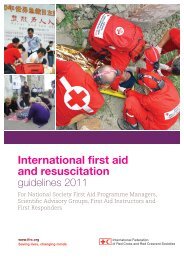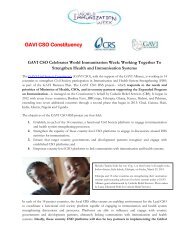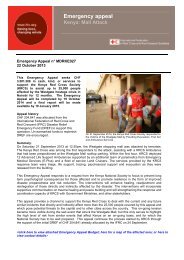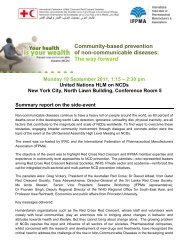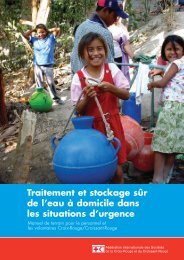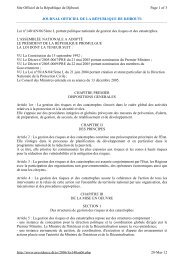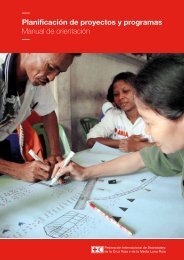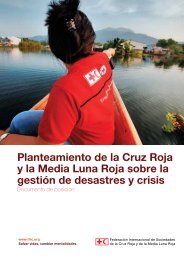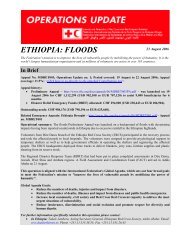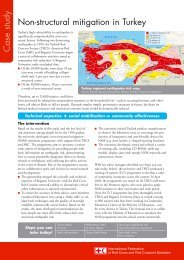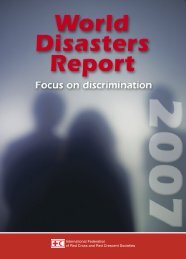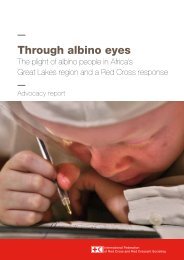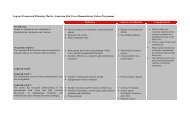World Disasters Report 2010 - International Federation of Red Cross ...
World Disasters Report 2010 - International Federation of Red Cross ...
World Disasters Report 2010 - International Federation of Red Cross ...
Create successful ePaper yourself
Turn your PDF publications into a flip-book with our unique Google optimized e-Paper software.
which was the 1961 flood that involved a major dam failure. Anticipating an increased<br />
frequency <strong>of</strong> floods due to climate change, a number <strong>of</strong> programmes have been put<br />
in place to build capacity, assess hazards and vulnerability, construct dams, dykes and<br />
seawalls, establish early warning systems, as well as projects concerning land-use planning,<br />
environmental protection and community education and resilience.<br />
A systematic city-wide plan <strong>of</strong> practical action to reduce flooding was implemented. A<br />
first step was to assess the flood risks by analysing hourly rainfall intensity and examining<br />
the likely changes in impacts in low-lying areas and places where natural drainage was<br />
blocked by the construction <strong>of</strong> houses or by roads without adequate bridges. A detailed<br />
city drainage map was developed. The plan introduced structural and planning measures<br />
for restoring natural drainage, widening streams, extending bridges and applying natural<br />
soil infiltration methodologies. Watershed conservation techniques, such as afforestation<br />
and building small earthen check dams, were undertaken in the hill zone. Property tax<br />
incentives were provided to encourage households to recycle wastewater or use rainwater<br />
harvesting by storing run-<strong>of</strong>f from their ro<strong>of</strong>s for domestic use. These efforts were complemented<br />
by improvements in flood monitoring and warning systems and social protection<br />
for affected families. The initiative was driven jointly by the elected municipal<br />
government, the municipal commissioner and Alert (active citizen groups), and involves<br />
many different city departments. It demonstrates that local governments can prepare for<br />
climate change by reducing and managing the local factors that lead to disasters.<br />
Essential 5<br />
Making all healthcare facilities safer<br />
Cayman Islands<br />
(From UNISDR, 2008–2009 <strong>World</strong> Disaster <strong>Red</strong>uction Campaign – Hospitals Safe from<br />
<strong>Disasters</strong>, Geneva, January 2008.)<br />
The Cayman Islands, which is made up <strong>of</strong> three islands, has experienced the largest<br />
number <strong>of</strong> hurricane strikes in the Atlantic basin. In September 2004, the biggest<br />
island, Grand Cayman, was hit by Hurricane Ivan, the islands’ worst hurricane<br />
in 86 years. Ivan destroyed or damaged 90 per cent <strong>of</strong> buildings. Power, water and<br />
communications were disrupted for months in some areas. But the island began a<br />
major rebuilding process, including in the health sector.<br />
The Cayman Islands adopted a National Strategic Framework for Disaster Risk <strong>Red</strong>uction.<br />
Within this framework, the Health Services Authority, as the islands’ primary<br />
provider <strong>of</strong> healthcare, implemented several activities to make all its facilities safer.<br />
These activities address structural, non-structural, functional and workforce issues.<br />
For instance, at the structural level, the 124-bed Cayman Islands Hospital (the territory’s<br />
principal healthcare facility) was built to Category 5 hurricane standards. Older<br />
facilities were upgraded to new local and international building codes and protocols<br />
for healthcare facilities, and seismic risk reduction elements were introduced in the<br />
<strong>World</strong> <strong>Disasters</strong> <strong>Report</strong> <strong>2010</strong> – Disaster data<br />
195



